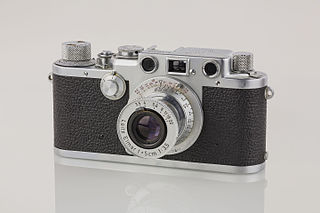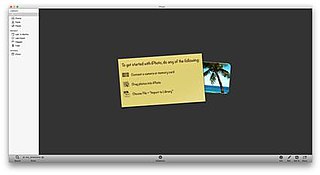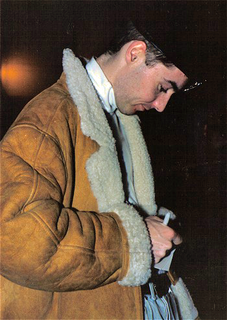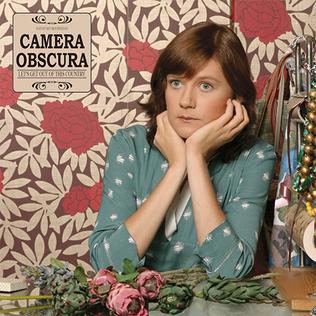
A camera is an optical instrument used to capture an image. At their most basic, cameras are sealed boxes with a small hole that allow light in to capture an image on a light-sensitive surface. Cameras have various mechanisms to control how the light falls onto the light-sensitive surface. Lenses focus the light entering the camera, the size of the aperture can be widened or narrowed to let more or less light into the camera, and a shutter mechanism determines the amount of time the photo-sensitive surface is exposed to the light.
Man with a Movie Camera is an experimental 1929 Soviet silent documentary film, directed by Dziga Vertov and edited by his wife Yelizaveta Svilova.

iPhoto was a digital photograph manipulation software application developed by Apple Inc. It was included with every Macintosh personal computer from 2002 to 2015, when it was replaced with Apple's Photos application. Originally sold as part of the iLife suite of digital media management applications, iPhoto was able to import, organize, edit, print and share digital photos.

Aztec Camera were a Scottish pop/new wave band formed by Roddy Frame, the group's singer, songwriter, and only consistent member. Formed in 1980, Aztec Camera released a total of six albums: High Land, Hard Rain (1983), Knife (1984), Love (1987), Stray (1990), Dreamland (1993) and Frestonia (1995). The band garnered popular success for the songs "Oblivious", "Somewhere in My Heart" and "Good Morning Britain".

The Hidden Cameras are a Canadian indie pop band. Fronted by singer-songwriter Joel Gibb, the band consists of a varying roster of musicians who play what Gibb once described as "gay church folk music". Their live performances have been elaborate, high-energy shows, featuring go-go dancers in balaclavas, a choir, and a string section.

Roddy Frame is a Scottish singer-songwriter and musician. He was the founder of the 1980s new wave band Aztec Camera, and has undertaken a solo career since the dissolution of the band. In November 2013, journalist Brian Donaldson described Frame as: "Aztec Camera wunderkind-turned-elder statesman of intelligent, melodic, wistful Scotpop."
David Fricke is an American music journalist who serves as the senior editor at Rolling Stone magazine, where he writes predominantly on rock music. One of the best known names in rock journalism, his career has spanned over 40 years. In the 1990s, he was the magazine's music editor before stepping down.

Camera Obscura is a Scottish indie pop band from Glasgow. The group formed in 1996 and have released five albums to date. The current members of the band are vocalist Tracyanne Campbell, guitarist Kenny McKeeve, bassist Gavin Dunbar, and drummer Lee Thomson.
7 is a number, numeral, and glyph.

Through the Camera Eye is a videocassette/laserdisc release by the Canadian band Rush. It was released in 1985 by PolyGram Records. It contains promotional videos issued for the band's albums Moving Pictures (1981), Signals (1982) and Grace Under Pressure (1984). Absent from the collection were the videos for "Limelight" and the album version of "Tom Sawyer", both filmed at Le Studio. The live version of "Tom Sawyer" comes from the concert video Exit... Stage Left (1982). No DVD re-issue was released.

Let's Get Out of This Country is the third studio record by the Scottish indie pop band Camera Obscura, released by Elefant Records on 6 June 2006. It was recorded in Sweden with the producer Jari Haapalainen, and arranged by Björn Yttling of Peter Bjorn and John.

Nazia Hassan was a Pakistani singer-songwriter, lawyer and social activist. Referred to as the "Queen of Pop" in South Asia, Sweetheart of India and Nightingale of PAKISTAN she began her music career at the age of 10, and went on to become one of the most prominent singers across South and Southeast Asia. She, along with her brother, Zoheb Hassan, went on to sell over 65 million records worldwide.

Live at Wembley is a video album by American singer Beyoncé. It was released on April 26, 2004, by Sony Urban Music and Columbia Music Video. The DVD features her concert at Wembley Arena in London, as part of her Dangerously in Love Tour in support of her debut solo studio album Dangerously in Love (2003). Most of the songs on Live at Wembley originate from Dangerously in Love, although Beyoncé also performed a medley of past songs by her former group Destiny's Child. Live at Wembley was critically acclaimed, with AllMusic giving it a grade of three-and-a-half stars out of five. The cover of Rose Royce's "Wishing on a Star", included on the album, was nominated in the category for Best Female R&B Vocal Performance at the 48th Annual Grammy Awards (2006).
POV most commonly refers to:

"Into the Lens" is a song written by Trevor Horn and Geoff Downes. It was originally released in 1980 by progressive rock band Yes, of which Horn and Downes were a part, as a part of the album Drama, before being reworked as "I Am a Camera" for the 1981 album Adventures in Modern Recording by The Buggles, a duo consisting of Horn and Downes; both versions were released as singles, with the Yes single being re-titled "Into the Lens ".

"Camera Phone" is the fourth single from The Game's third album, LAX. The song features R&B singer Ne-Yo. The song was produced by Cool & Dre. It appears as a bonus track on the deluxe edition of the album only. The single was only released for download in the UK and not the USA. In the UK, "Camera Phone" was the second single taken from LAX. It did not originally feature on the UK edition of the album and was thus re-issued, removing the "Intro" and "Outro" and adding "Camera Phone" as the final track.

A selfie is a self-portrait photograph, typically taken with a digital camera or smartphone, which may be held in the hand or supported by a selfie stick. Selfies are often shared on social media, via social networking services such as Facebook, Twitter, Snapchat, and Instagram.











